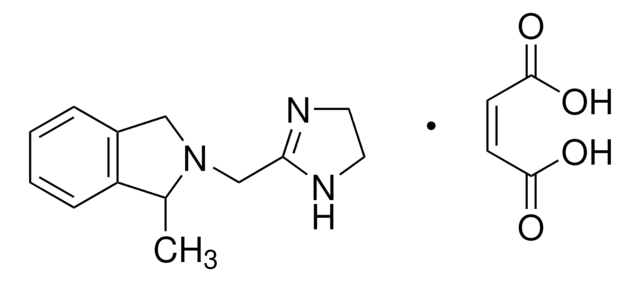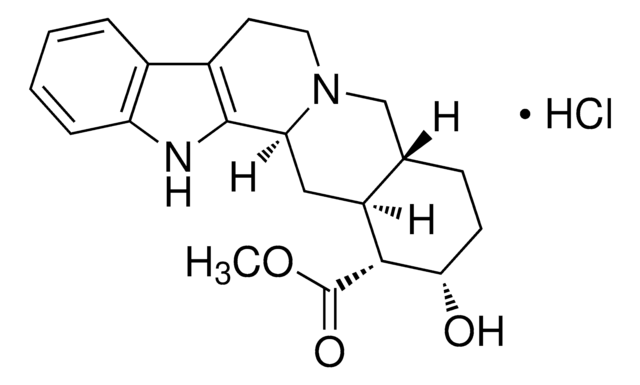C-051
Caffeine solution
1.0 mg/mL in methanol, ampule of 1 mL, certified reference material, Cerilliant®
About This Item
Recommended Products
grade
certified reference material
Quality Level
form
liquid
feature
SNAP-N-SPIKE®, SNAP-N-SHOOT®
packaging
ampule of 1 mL
manufacturer/tradename
Cerilliant®
concentration
1.0 mg/mL in methanol
technique(s)
gas chromatography (GC): suitable
liquid chromatography (LC): suitable
application(s)
forensics and toxicology
format
single component solution
storage temp.
−20°C
SMILES string
CN1C(=O)N(C)c2ncn(C)c2C1=O
InChI
1S/C8H10N4O2/c1-10-4-9-6-5(10)7(13)12(3)8(14)11(6)2/h4H,1-3H3
InChI key
RYYVLZVUVIJVGH-UHFFFAOYSA-N
Gene Information
human ... ADORA1(134) , ADORA2A(135) , ADORA2B(136) , ADORA3(140)
Looking for similar products? Visit Product Comparison Guide
General description
Caffeine belongs to the class of active alkaloid compounds, mainly found in the leaves, fruits, and seeds of about 63 plant species. Coffee beans are the primary source of caffeine, in addition to tea leaves, chocolates, and energy drinks soft drinks. It is a central nervous system stimulant and acts by increasing alertness and reducing sleep.
Application
- To determine caffeine content in an aqueous solution of green coffee beans by two methods based on Fourier transform infrared spectroscopy-attenuated total reflectance (FTIR-ATR) and fluorescence spectrophotometry
- Extraction of caffeine by automated homogeneous liquid-liquid microextraction (A-HLLME) from five different beverage samples for its quantification by high-performance liquid chromatography combined with UV detection
- Simultaneous estimation of caffeine and chlorogenic acids in ground green coffee samples by a UV/Vis spectrometric method
- Multi-residue determination of caffeine and paracetamol by square-wave voltammetry using poly(4-amino-3-hydroxynaphthalene sulfonic acid)-modified glassy carbon electrode (poly(AHNSA)/GCE in coca-cola, pepsi, and tea samples
- Cyclic voltammetric and differential pulse voltammetric based detection and quantitative analysis of paracetamol, tryptophan, and caffeine, both separately and simultaneously, using an electrochemical sensor founded on tin sulfide (SnS)-titanium dioxide (TiO2)-graphene oxide (GO) composite modified glassy carbon electrode
Features and Benefits
- Fully characterized under ISO/IEC 17025 and ISO 17034 accreditation
- Accompanied with a comprehensive Certificate of Analysis (CoA) with data on stability, homogeneity, accuracy of concentration, uncertainty, and traceability
- Rigorously tested through real-time stability studies to ensure accuracy and shelf life
- Gravimetrically prepared using qualified precision balances to ensure minimal uncertainty
- Flame sealed under argon into ampoules for long-term shelf life
- Offered in a convenient, DEA-exempt format to improve laboratory efficiency
Legal Information
related product
Signal Word
Danger
Hazard Statements
Precautionary Statements
Hazard Classifications
Acute Tox. 3 Dermal - Acute Tox. 3 Inhalation - Acute Tox. 3 Oral - Flam. Liq. 2 - STOT SE 1
Storage Class Code
3 - Flammable liquids
WGK
WGK 1
Flash Point(F)
49.5 °F - closed cup
Flash Point(C)
9.7 °C - closed cup
Regulatory Listings
Regulatory Listings are mainly provided for chemical products. Only limited information can be provided here for non-chemical products. No entry means none of the components are listed. It is the user’s obligation to ensure the safe and legal use of the product.
FSL
Group 4: Flammable liquids
Alcohols
Hazardous rank II
ISHL Indicated Name
Substances Subject to be Indicated Names
ISHL Notified Names
Substances Subject to be Notified Names
JAN Code
C-051-CC:
C-051-1ML:4548173316703
Certificates of Analysis (COA)
Search for Certificates of Analysis (COA) by entering the products Lot/Batch Number. Lot and Batch Numbers can be found on a product’s label following the words ‘Lot’ or ‘Batch’.
Already Own This Product?
Find documentation for the products that you have recently purchased in the Document Library.
Customers Also Viewed
Our team of scientists has experience in all areas of research including Life Science, Material Science, Chemical Synthesis, Chromatography, Analytical and many others.
Contact Technical Service










